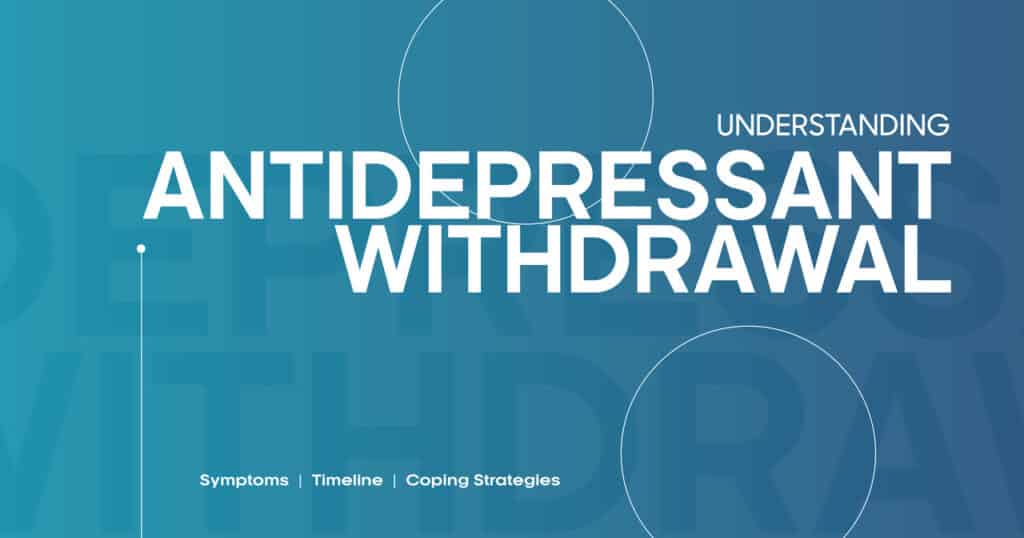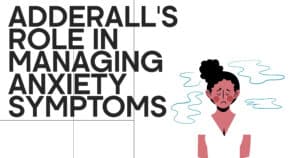Nowadays it is impossible to imagine effective treatment and management of depression without a combination of psychotherapy and prescription medication. Antidepressants were invented to allow adults with various symptoms and backgrounds to enjoy a normal life. Still, there may be personal reasons for a particular individual to stop using the medication – and this is when antidepressant withdrawal may begin.
In this article we will discuss the signs of antidepressant withdrawal, explore the techniques of dealing with this problem, and discover if there is a real possibility to lead a fulfilling life after antidepressants.
3 Ways to Manage Antidepressant Withdrawal
Try Professional Counseling
Surprisingly, even after an antidepressant is prescribed and requires the patient to stay in contact with their mental health provider, some individuals believe that medication is enough for them to manage their mental health issues – just as they think therapy is not going to be useful when they stop taking antidepressants.
You should discuss your decision with a therapist and stick to their advice, especially if they tell you this is not a good option for you at the moment for some reason – be wise and rely on an expert opinion.
Practice Self-Care
While relaxation practices cannot always directly replace the medication you take to handle the symptoms of a mental disorder, there are still numerous ways to manage your anxiety and stress making your mental wellness a priority.
Dedicate a few minutes every day to various activities that make you feel relaxed and comfortable – whether you give a chance to yoga and meditation, keep a journal to write down your thoughts and later reflect on your experiences, or implement aromatherapy to create a positive atmosphere in your room, all these practices can enrich your life and remind you of the joys of comfort.
Remain Flexible in Your Plans
Remember that certain disorders require medication due to the severity of symptoms – besides, it is hard to predict how your body will react to your decision to stay away from antidepressants, even with a go-ahead from the doctor.
If the adjustment of the dose or getting off antidepressants results in the aggravation of symptoms, immediately let your doctor know about this. Taking medications approved by a doctor does not mean a failure – be mindful of your body and mind when agreeing to or refusing any kind of treatment.
What Is Antidepressant Withdrawal?
Antidepressant withdrawal refers to a variety of health implications that occur after the person stops taking medication designed to help them eliminate or lessen the symptoms of a depressive disorder. Similar to what happens with other substances that affect your brain both immediately and in the long run, antidepressants increase the levels of neurotransmitters in your brain, which is why your decision to no longer take these medications will have consequences.
From symptoms you may attribute to regular flu or stomach flu to major sleep disturbances, the discontinuation of antidepressant medication should be discussed with a therapist or psychiatrist who prescribed the antidepressants in the first place. As for the reasons to stop using antidepressants, they vary from person to person – some individuals may be tired of the side effects of the medication such as sweating or headaches, others are not happy about the weight gain caused by the medication, and some people may follow the advice of their doctors and take a break to see how they feel without any medications in their systems.
What Are Antidepressant Withdrawal Symptoms?
While only a doctor can correctly diagnose antidepressant withdrawal, there are certain signs you can easily notice when you quit antidepressants – check the table below to learn more about common symptoms of antidepressant withdrawal:
| Symptom | Description |
| Body Aches, Weakness, Dizziness, and Loss of Appetite | Your body cannot adjust to the abrupt withdrawal and will react right away – make sure you do not confuse the withdrawal with flu or similar illnesses |
Mood Swings | Instability of emotions is a common sign of antidepressant withdrawal – you will feel stressed out, irritated, aggressive, and agitated for no apparent reason |
Nausea | In certain cases, nausea will not be the only sign of withdrawal – apart from general discomfort and unease, the person may also vomit |
Sleep Disturbances | It is difficult to fall asleep when you are no longer taking medication that helped you battle your insomnia in the past. Moreover, some individuals may even have nightmares when they finally manage to sleep |
Bear in mind that every case is unique – it is possible you will experience completely new symptoms and sensations, just as it is likely the symptoms you will feel will remind you of the initial reason to take antidepressants.
How Long Does Antidepressant Withdrawal Last?
Every case is different, and even a doctor with years of experience cannot tell you when you will first feel the symptoms of antidepressant withdrawal. Nevertheless, most individuals feel discomfort within four or five days after they last took the medication they no longer want to use, and these symptoms last for about one or two weeks.
If you rely on antidepressants for a significant amount of time or the symptoms of your mental illness interfere with your daily life, the withdrawal may last longer – up to a month or even more. Reach out to your therapist if you cannot deal with the adverse effects of antidepressant withdrawal on your own.
3 Tips That Help With Antidepressant Withdrawal
If you took a firm decision to come off your antidepressants or you are looking into the possibility of doing it safely and without lasting negative impact on your physical and mental health, here are a few suggestions you should take into account today:
Gradual Tapering Is Essential
Follow the advice of your therapist to come off antidepressants gradually. It is possible to slowly reduce the dose – most patients need a few weeks or months to learn how to manage their symptoms without medication.
Note that only a doctor will be able to tell you how long the process in question will last – it depends on several factors, such as the type of medication, the dose you were prescribed to take, and the duration of your medication-based treatment. Remain in contact with your doctor to inform them if slowly coming off antidepressants led to side effects you were not warned about.
Focus on Healthy Lifestyle Changes
As long as a mental health professional you trust confirms you can manage your mental disorder without medication, you should make permanent changes to your lifestyle.
If previously you did not pay much attention to proper nutrition, saw exercise as a nuisance, and tried to elevate your mood with harmful substances like alcohol, it may be the right time to cope with mental health issues in the most natural way. Add variety to your diet, find what physical activity brings you joy, and abstain from drinking alcoholic beverages whenever you feel down.
Seek Emotional and Professional Support
The best remedy for individuals who want to stop taking antidepressants is talking therapy – whether you try private counseling or join a support group where people with your mental disorder can share their experiences and relate to each other’s stories, opening up about your struggles and having someone to provide you with support at such a vulnerable time will result in medication-free life.
Moreover, you can and should reach out to your loved ones who already know you and can give you solace as you embark on a new chapter in your mental health journey.
Antidepressant Withdrawal | FAQs
- How long do antidepressants stay in your system?
Since you last used the medication prescribed to you to cope with the depression symptoms, around four to seven days should pass for the antidepressants to have no trace in your system.
- What is the hardest antidepressant to get off of?
The hardest antidepressant to leave in the past would be the one that causes the person to deal with the most challenging symptoms of withdrawal – there are high chances medication that increases the levels of serotonin in your brain such as selective serotonin reuptake inhibitors (SSRIs) will be the most difficult to come off of.
- How can I recognize the symptoms of antidepressant withdrawal?
Headaches, nausea, dizziness, irritability, and insomnia are among the most common symptoms – be on the lookout for these signs and do not confuse them with complications you may have because of flu.
- How long does it take for your mood to stabilize after antidepressant withdrawal?
Just like other signs of antidepressant withdrawal, mood fluctuations are not supposed to last longer than two weeks. Be ready to see a doctor if there is no substantial change in your demeanor and behavior.
- Is it okay to stop my antidepressants?
While the final decision is yours, make sure you reach out to a mental health professional to talk about the pros and cons of your choice. It is possible a doctor will agree with you yet due to a potential withdrawal, medical supervision is going to be recommended to you.




